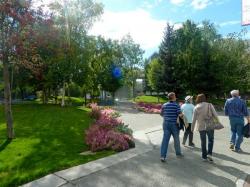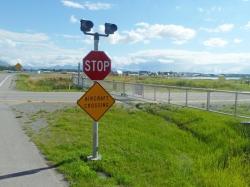Ever heard of a capital city which you cannot reach by car or truck?
 I hadn't either until arriving in Juneau, Alaska. The state capital is about 33,000 people built between a forested mountain and a good-sized harbour that reaches into the Gulf of Alaska. The city is actually south of Whitehorse!
I hadn't either until arriving in Juneau, Alaska. The state capital is about 33,000 people built between a forested mountain and a good-sized harbour that reaches into the Gulf of Alaska. The city is actually south of Whitehorse!
Because of the rugged terrain the city can only be reached by air or sea. Since about 1 in 6 Alaskans have their own small plane (there are warning signs near airports giving the right-of-way to planes landing that are crossing roads drivers beware!), and oodles more have a boat, the capital survives nicely. It is an attractive city with good public amenities, some lively bars and restaurants, and a local economy based on tourists and natural resources.
 Anchorage, on the other hand, is a remarkably green and attractive city. Nearly 300,000 people live there, and the city has done exemplary planning and has a surprising commitment to public places and spaces. There are a number of large, green parks in the downtown area, attractive public art and public meeting places. The flower baskets on street poles are watered once or twice a day by the city. Fast food carts offering reindeer sausages abound. The official launch site of the famous Iditarod Race is just steps from the downtown core.
Anchorage, on the other hand, is a remarkably green and attractive city. Nearly 300,000 people live there, and the city has done exemplary planning and has a surprising commitment to public places and spaces. There are a number of large, green parks in the downtown area, attractive public art and public meeting places. The flower baskets on street poles are watered once or twice a day by the city. Fast food carts offering reindeer sausages abound. The official launch site of the famous Iditarod Race is just steps from the downtown core.
I've been fortunate to be asked to speak at events in Yellowknife and Whitehorse, but this was my first visit to Alaska. To be honest, Anchorage is more culturally developed and has a greater sense of its public realm. It is an extremely attractive city in the summer. Craft breweries with roof-top patios and bars overlook the harbour, and they are buzzing. Much of the local economy is tourist-driven so the locals are considerate of visitors and their needs.
A tour of the city reveals the devastation that remains from the earthquake that struck in March 1964. The quake registered a stunning 9.2 on the Richter scale. It was the largest earthquake ever recorded in the United States. It was followed by a tsunami that brought further devastation. When done, 131 people had lost their lives, and more than $2 billion in damage had occurred. Some parts of the city are still affected today, and few original buildings remain. The city has rebuilt with both low and hi-rise buildings dotted throughout the city.
The size of the state (twice the size of Texas) is overwhelming. The mountain ranges, glaciers, acres of forest, lakes and rivers all combine for a stunning view of nature, and a very special part of the United States. Spotting a brown bear nabbing a salmon from a stream, or seeing a bald eagle perched on a roof top, brings home the importance of nature to the state and its tourist base. Standing in front of a massive glacier that is thousands of years old is sobering when you are told by park rangers how much the glacier is retreating every year.
Dining on fresh Alaskan salmon, halibut and king crab legs makes for sumptuous feasts. The August weather is very pleasant, many people wander around in shorts and T-shirts. Shops seem to be focused on jewellery and gold trinkets not surprising, since so much of the state's development came from the gold rush more than a century ago.
The state remains independent in spirit, and there are some characters in the towns and cities one visits.
One wonders where was Great Britain in 1867 when the US was spending 7.2 million very smart dollars to buy Alaska from Russia?
It would have been a brilliant addition to what has become Canada. Sigh.













